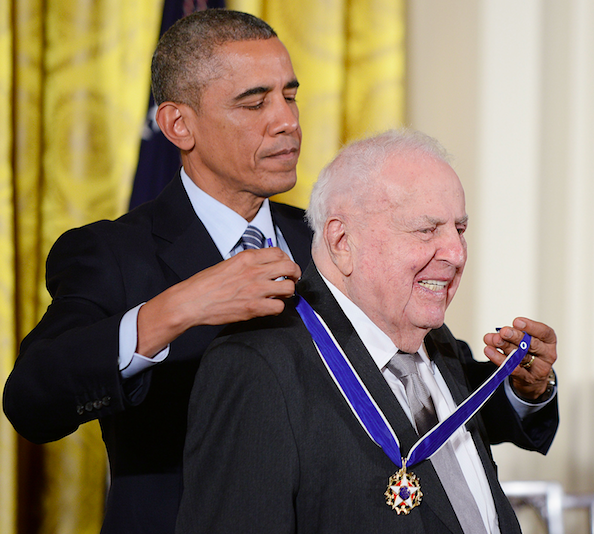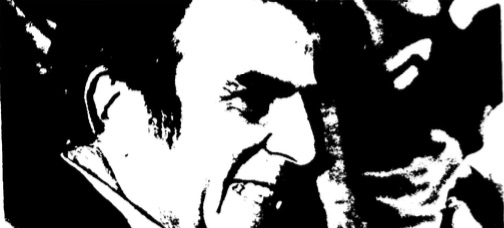Liberal icon Abner Mikva initiated legacy of Democratic activism in Evanston

(Olivier Douliery/Abaca Press/TNS)
President Barack Obama presents the Medal of Freedom to Abner Mikva during a ceremony in the East Room of the White House in 2014. Mikva died on July 4 at age 90.
July 11, 2016
Abner Mikva moved to Evanston at the right time.
In 1971, the progressive politician and former federal judge — who died last week at age 90 — rented an apartment just around the corner from where Tommy Nevin’s Pub now stands. After representing the Hyde Park congressional district for two terms, reapportionment had positioned Mikva to run against Democratic Rep. Ralph Metcalfe, a popular black politician, on Chicago’s South Side — so Mikva moved to Evanston in the hopes of getting elected to the 10th District.
The same year the Chicago politician headed north, 18-year-olds were granted the constitutional right to vote. Young people on Northwestern’s campus became critical in electing Mikva, and in turn, creating a legacy of liberal political activism in Evanston.
“The eighteen-year-old vote is an untapped resource recognized by most politicians,” Mikva told NU students at Willard Residential College in January 1972, warning students not to “turn their backs on ballots.”
Mikva lost that election. But student organizers came back to work for him in 1974, when Mikva took the 10th District and held on for two more cycles.
“He helped turn Evanston into a very, very active Democratic Party,” said Judge Jerry Esrig of the Circuit Court of Cook County, who helped coordinate Mikva’s campaigns as a student at NU and later worked on his congressional staff.
Esrig (Weinberg ’74) said Mikva was known as a staunch opponent of Chicago Mayor Richard J. Daley’s Democratic machine, embracing campaign tactics of doorbell ringing and organizing a volunteer army rather than relying on traditions of political patronage.
Mikva moved on to serve as chief judge of the United States Court of Appeals for the District of Columbia, White House counsel to Bill Clinton and a professor at both NU and University of Chicago law schools. The progressive heavyweight is remembered for championing criminal justice reform and gun control, as well as his 1993 decision striking down a ban on gay people serving in the U.S. military.
NU School of Law Prof. Stephen Presser, who once debated Mikva, called the former judge a “very accomplished partisan battler” and an “outstanding liberal.”
But in 1972, Evanston didn’t appear to be well-suited for a Democratic congressperson. The town had voted for Barry Goldwater for president in 1964 and Richard Nixon in 1968, and the past seven congressmen elected in the district had been Republican.
That Republican tradition is part of the reason why Mikva campaigners like Esrig honed in on the student vote, focusing on registering NU students who came from outside the district to vote in the 10th. Ahead of the 1972 election, the operation set up headquarters at 1611 Chicago Ave., next door to what is now Tapas Barcelona, and courted students by campaigning on Mikva’s opposition to the Vietnam War.
Former appellate Judge James Epstein, a longtime family friend of Mikva’s who worked for him in various stages of his career, said the candidate spoke about Vietnam in a “non-confrontational” but logical way. After students blockaded Sheridan Road with fences, lumber and trash cans in May 1972 in part to protest the country’s involvement in the war, Mikva encouraged students to use political means rather than barricades to achieve peace.
“It’s less romantic,” Mikva told The Daily in 1972. “But it’s the only answer that can work.”
In a Daily editorial before the March 1972 congressional primary, editors urged their peers to vote for Mikva based on his “stands against militarism” and “humanitarian approach toward government.”

Abner Mikva on election night in 1974. Mikva won that race to represent the 10th District and was reelected twice after that.
Epstein (Weinberg ’75, School of Law ’78) left college in Michigan to work for Mikva’s first campaign in Evanston — then after he lost, Epstein transferred to NU, where he remained involved in galvanizing the student vote.
“Here was somebody who was really good and was really focused on trying to bring the war to an end,” Epstein said. “By registering in Evanston and helping in that campaign (students) could be involved in a very influential election.”
Bonnie Wilson, a 75-year-old Evanston resident and Mikva volunteer in the ’70s, said her current social base was built on the activist infrastructure of the Mikva campaigns. Wilson, who later served as president of the Democratic Party of Evanston, said Evanston had been red for years, and Mikva changed that.
“There are times when someone stands out as such a good candidate, such a strong leader, such an ethical person, that it inspires people to leave their comfort zone and support somebody of a different party,” Epstein said. “It was a magical ability he had to reach people.”
Mikva not only inspired the endurance of ground-level activists in Evanston and Chicago but mentored several big-name Washington liberals, such as Supreme Court Justice Elena Kagan and President Barack Obama. The president said when he graduated law school, Mikva encouraged him to pursue public service.
“He saw something in me that I didn’t yet see in myself, but I know why he did it — Ab represented the best of public service himself and he believed in empowering the next generation of young people to shape our country,” Obama said in a statement.
The president awarded Mikva the Presidential Medal of Freedom in 2014.
Rep. Jan Schakowsky (D-Evanston), who currently represents Evanston in the state’s 9th District, was among the thousands of volunteers working for Mikva in his early campaigns. Schakowsky wrote in a Facebook post that the politician taught a “whole generation to believe that politics is a noble calling.”
And at a meeting of Illinois constituents in Washington on Thursday, Sen. Dick Durbin (D-Ill.) returned to Mikva’s lessons multiple times while answering questions from a group comprised largely of college and graduate students.
“He used to say, ‘Don’t pick your heroes out of history books,’” Durbin said. “It’s good to know the story of George Washington, Abraham Lincoln, whoever it may be. But look for real heroes in the here and now.”
Mikva’s influence became institutionalized when, in 1997, he and his wife Zoe founded the Mikva Challenge, a nonprofit that seeks to engage young people in politics. The Mikva Challenge involves about 6,000 students each year in programs across the Chicago area.
Esrig said even during Mikva’s later years, he remained entirely focused on the political road ahead. About two months ago, at a lunch date in Chicago with Mikva and Epstein, the trio spent almost no time reminiscing, Esrig said. Instead of talking about the past, Mikva preferred to discuss upcoming Illinois elections and new legislation in Springfield.
“Isn’t it remarkable,” Epstein said. “That here’s a man, 90 years old … all he wants to do is talk about what needs to be done in the future.”
Email: juliajacobs2018@u.northwestern.edu
Twitter: @juliarebeccaj

